By Ben Potter
Even those of you who have only recently taken an interest in the classical world will have a pretty decent idea about what to expect when picking up a copy of Homer’s Odyssey, his blockbuster sequel to the Trojan War epic, the Iliad.
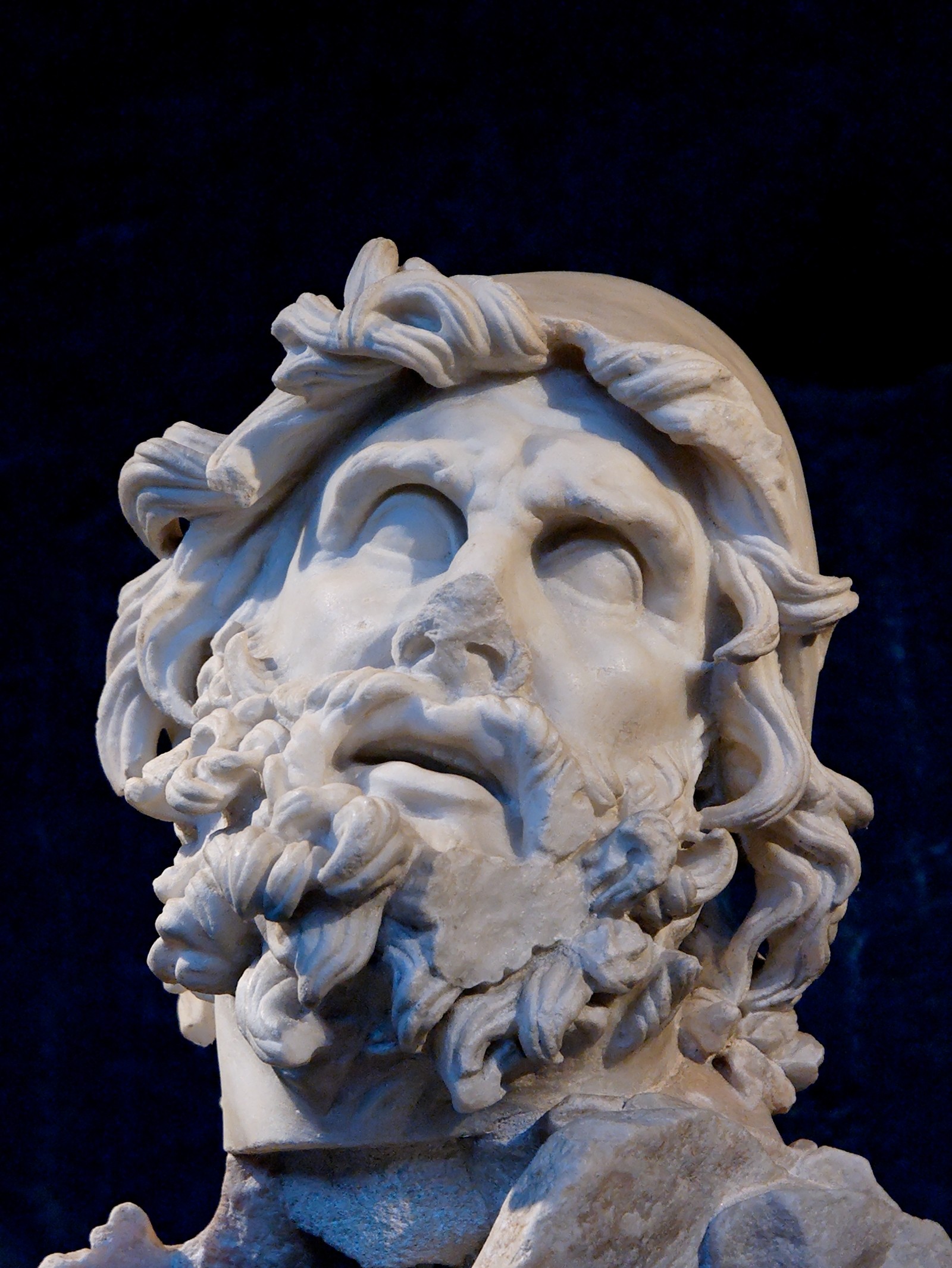 Odysseus
OdysseusThis familiar tale of the eponymous Odysseus taking ten long years to traverse the breadth of Greece, from the ruins of Troy to his home on Ithaca (having already spent ten years fighting the war itself), can be roughly divided into four distinct sections:
Books I-IV deal with the adventures of Odysseus’ son Telemachus.
Books V-VIII show Odysseus being released from the clutches of the nymph Calypso, to whom our hero has been a sex-slave for seven years. He then travels to Scheria, home of the noble Phaeacians.
Books IX-XII contain stories told by Odysseus to the Phaeacian king and queen about why it has taken him so long to get home. Here are recounted the most famous stories of Odysseus e.g. Circe turning his men to pigs, the descent into the underworld, the Cyclops, the Sirens, Scylla and Charybdis.
Books XIII-XXIV show Odysseus back on Ithaca going about his heroic business of vanquishing a group of Suitors – uncouth local nobles who have taken up at his court, who are attempting to kill his son and marry his wife, Penelope (and with her take the throne of Ithaca).
So what is it about this story, this twenty-four book long epic poem, that captures the imagination? Why, when there is so much choice of literature from the classical world, is it still so popular, so enduring? Why does it unquestioningly rank as one of the greatest of all great works and retain a special place in the heart of academics and laymen alike?
Well, there’re plenty of obvious reasons – the very most obvious of which is that it is, of course, a very high quality piece of literature. That aside, there’s also the hugely important historical and cultural significance of the
So what is it about this story, this twenty-four book long epic poem, that captures the imagination? Why, when there is so much choice of literature from the classical world, is it still so popular, so enduring?
piece. Perhaps no other secular (i.e. non-holy) work has had a greater impact on the world than that of Homer.
Not only do the Homeric texts underpin so much of ancient Greek culture, but they, by proxy, have a similar such influence on Roman, European, and (if somewhat obliquely) New World cultures.
On top of this, the Odyssey can boast a great richness of language and would have been rhythmically (i.e. poetically) pleasing – even if this last aspect is somewhat lost on us today.
So, there’s plenty to shout about in terms of style and significance, but what about substance? What details of plot and character have managed to excite and amaze for the better part of three millennia?
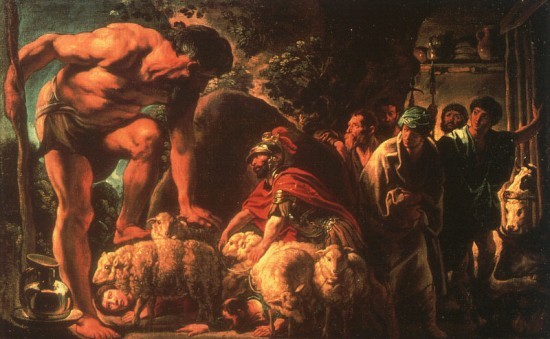
Odysseus and the Cyclops
There are, of course, plenty of (what we would now call) dramatic staples, certainly enough to write a pulse-quickening blurb on the back of the dust-jacket: a sea-tossed hero, a family in danger, seductive femme-fatales, constant peril, fights, races, monsters, romance, sex, blood, noble peasants, evil aristocrats, a flawed hero, a long suffering wife, capricious gods… you can almost picture the cigar-chomping Hollywood mogul tripping over himself in a rush to buy the exclusive rights (despite complaining: “but the name’s no darn good. Odysseus!? Let’s call him… Buster MacNally”).
All this is well and good and certainly lends human interest and spectacular grandeur to the work, but one of the most intriguing things about the epic, one of the things that make its analysis and rereading so rewarding, is much more psychological and cerebral. In the words of eminent Homeric scholar P.V. Jones: “the rich interaction of past and present is one of the great glories of the Odyssey”.
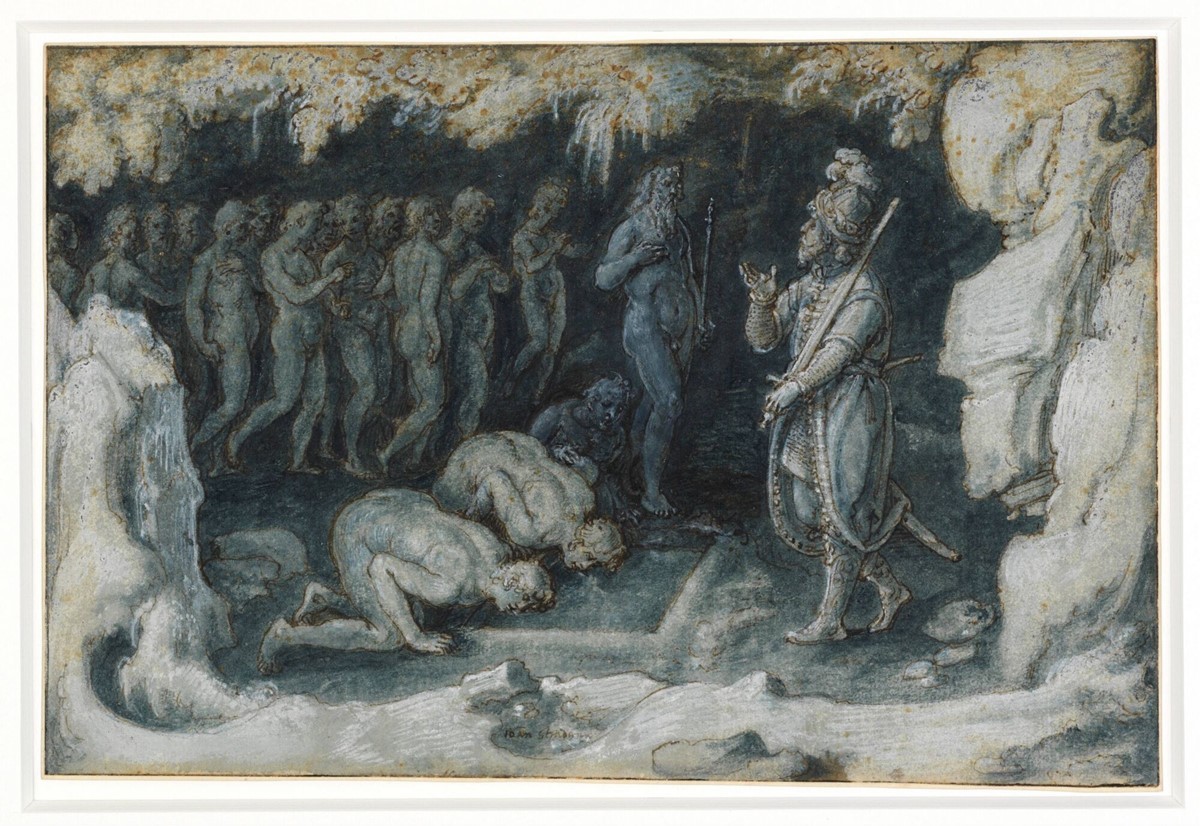
Odysseus in the Underworld
Obviously, being a sequel, the Odyssey harks back to the Iliad and the entire mythology (more like a heroic history to the Greeks) surrounding the Trojan War. In particular, Book XI – the Nekyia (the book of the dead) – gives us a chance to indulge in a veritable smorgasbord of Trojan War heroes who spellbind the audience with their ghoulish cameos.
This retrospective, however, may not tickle everyone’s fancy; indeed it may only pique the interest of Iliad lovers or Greek mythology nerds. Moreover, the fact that Homer’s depictions have become canonised means that the revelations from the lips of the deceased, though of interest, do not create the same wide-eyed wonder in a modern audience as they would have done in antiquity.
However, this orgy of nostalgia may only have been part of what Jones was referring to. A much more interesting notion (and here we pick up on the cerebral and psychological aspect) is that books IX-XII are a complete fantasy.
The Plot Twist of The Odyssey
These four books contain the tales told by Odysseus to his regal hosts on the island of Scheria/Phaeacia. However, unlike the other stories in the epic which are told to us by the poet, these tales are directly narrated by Odysseus himself; what is more, all of the characters who shared in these adventures with him (i.e. his crew) have died. Thus, so the theory goes, the Odyssey isn’t merely one of the earliest examples of folklore and epic poetry we have, but may also have given birth to a ‘Kaiser Soze’ style plot-twist.
This idea is given credence as more than merely a literary conspiracy-theory by the nature of the main character, a nature that is defined by the epithets Homer gives him: ‘master of stratagems’, ‘cunning’ and ‘nimble-witted’. Let’s not forget that Odysseus was the man to come up with the idea of the Trojan Horse in the first place; duplicity and lies are part of his make-up… and a noble and heroic part at that.
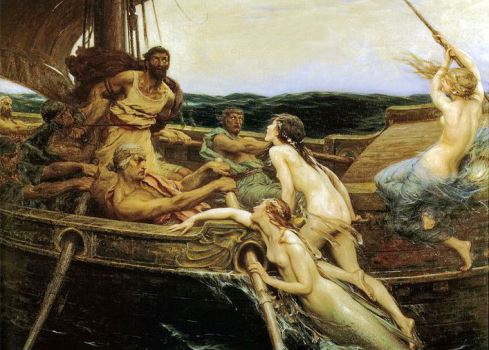 Odysseus and the Sirens
Odysseus and the SirensOkay, so maybe we’re happy to accept that our hero could do this, but why would he? Well, the two popular theories are as follows: the first is that he is doing it to enhance his kleos, the ultimate goal for every Homeric hero. Kleos is often loosely translated as ‘reputation’, but more accurately means ‘what people hear about you’. The key point is that it is not necessary for the things heard to be true, only that they are recounted through the ages. Thus, Odysseus has ten unaccounted-for years to fill up with fantastical stories that glorify his name.
N.B. An interesting, if slightly paradoxical, point is that it would not really matter if it became known that Odysseus had lied about his journey between Tory and Scheria, provided that he had managed to trick people into believing what he’d said was true. Either the actions themselves (i.e. defeating the Cyclops, etc.) or the brilliant lies about them are enough to elevate him to legendary hero status.
The other explanation is that the twenty years of war and storm-tossed seas (and whatever else he got up to if the stories he tells King Alcinous were falsified) have left our protagonist with a psychology that’s either inherently mistrustful, or perversely deranged. In other words, either he’s gotten so used to lying to protect himself that doing so has become an instinct, or maybe even a compulsion, or alternately he is suffering from some sort of trauma – perhaps PTSD – and fantastical deceit is one of its manifestations.
N.B. Obviously there was no such label as PTSD in ancient Greece, but, given Homer’s knowledge of war, we can assume he was either a fighter himself, or was in contact with soldiers. Thus, he would have observed the psychological effects of war, even if they had been dismissed as something more basic e.g. mischief from the gods or cowardice.
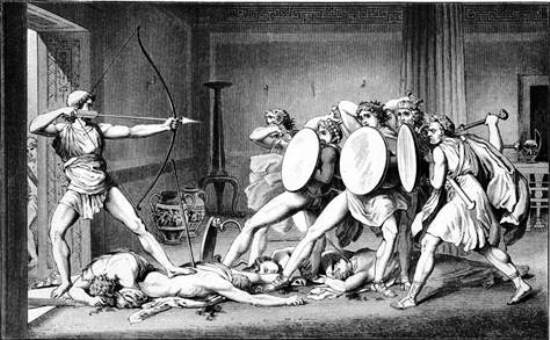 Odysseus fights Penelope’s suitors
Odysseus fights Penelope’s suitorsThis idea of compulsive behavior has its best evidence at the end of the epic after Odysseus has been re-established as king of Ithaca and his identity is commonly known. Known to all, that is, except his ancient father, Laertes, who is pining for his lost, possibly dead, son. Instead of revealing his identity and embracing Laertes, Odysseus claims to be called Eperitos, son of Apheidas, from Alybas. He only actually reveals who he is after his elderly father has some sort of panic attack.
If our hero cannot bring himself to be honest with his own frail father and feels the need to instantly concoct a rather pointless and hurtful falsehood, then surely we must question the authority of everything he says that Homer, as narrator, doesn’t corroborate?
Interestingly, if we do dismiss what Odysseus says to the Phaeacians as a pack of lies, then there is nothing overtly supernatural or otherworldly in the epic. Though gods do appear, speak and act in the present (as opposed to the past) passages of the book, their actions are only an extrapolation or interpretation of physically accountable things i.e. giving somebody strength, making someone more beautiful, planting an idea in someone’s head etc.
So did Homer want us to ask questions about the mental capacity or moral fibre of his hero? Well… possibly, possibly not. However, it does seem likely that the rich texture of the work and psychology of the characters is not something that happened by accident, but was devised by an author who was either instinctively in tune with the nuances of human nature, or the world’s first student of psychology!
It is up to us to put our faith in whatever Odysseus we prefer. If we decide to believe in the one who fabricated all of the weirdest and most wondrous tales from perhaps the most famous story ever told, then we can. If we prefer to take him on face value, then our hero is simply extraordinarily strong, courageous and intelligent. Indeed, he is these three things whichever view we take. However, if we take the former, more psychological, view—then a new and intriguing question comes to the fore, one that could barely be answered in all the pages of all the Odysseys that have ever been published: what exactly was Odysseus up to for those ten, lost years?
Conspiracy theories on a postcard to the usual address!









No comments
Trackbacks
Our apologies, you must be logged in to post a comment.